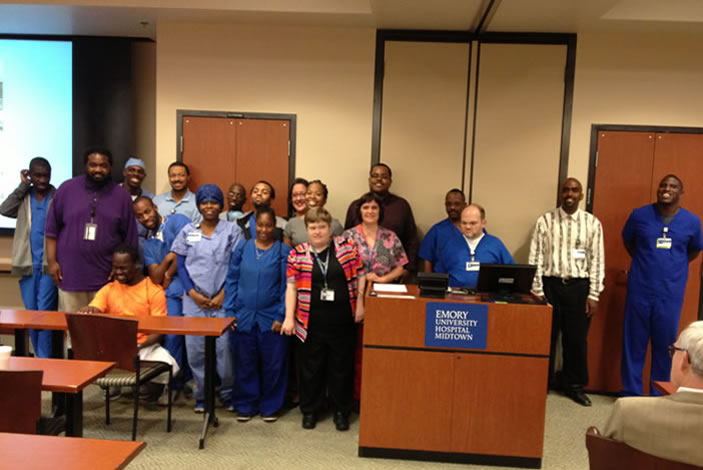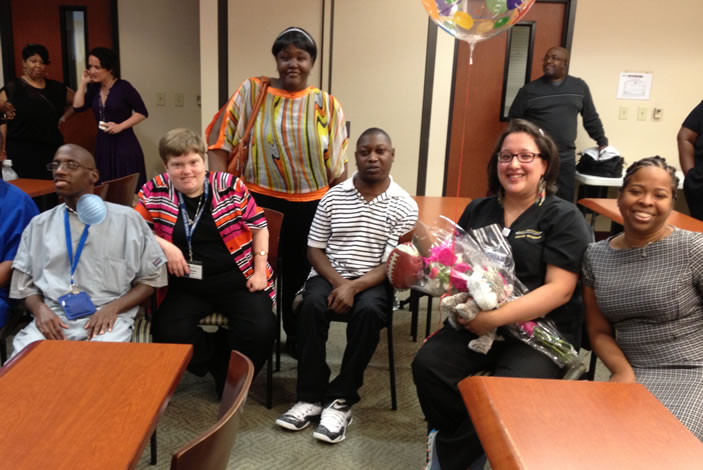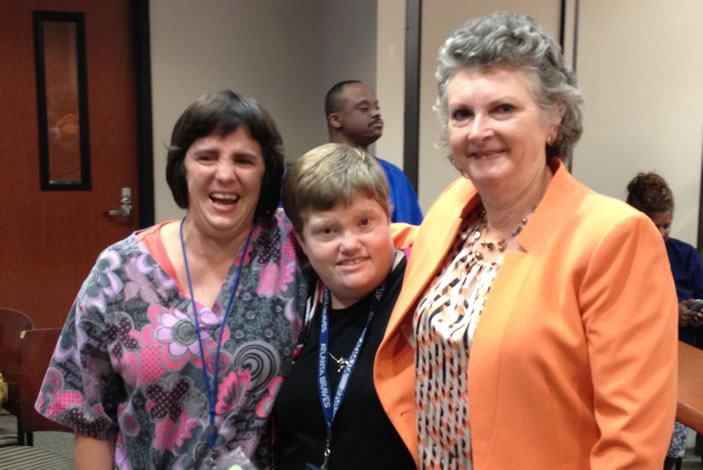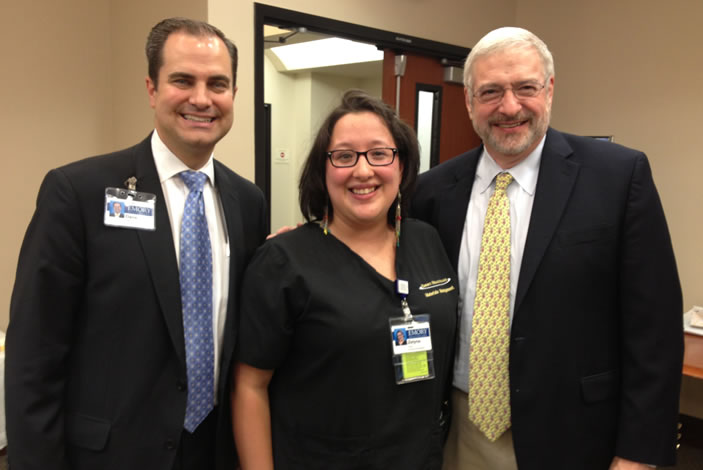Project Search, the program that provides employment for often hard-to-fill positions with young people who have developmental disabilities, is celebrating 10 years of service at Emory Healthcare. The anniversary falls in October, which coincides with National Disability Employment Awareness Month.
In 2004, Project Search came to life at Emory University Hospital Midtown with the help of Briggs & Associates, a local company with a 25-year history of developing non-traditional employment for people with a wide range of disabilities. The program started with seven high school graduating seniors who received on the job training in the hospital, which included having classroom time and rotation though various hospital departments for one year until the students and the departments found a perfect match. Jobs include stocking carts with medical supplies, escorting patients and patient families to their destinations, transporting lab work to the lab, distributing equipment, prepping patients’ charts and filing documents, plus more.
With a continuous shortage of registered nurses and medical technicians in hospitals today, routine and often time-consuming tasks such as these are pushed aside to focus on patient care. Many of these tasks do not require the level of expertise that nurses and technicians possess. But the jobs still need to be done.
"The Project Search employees have positively impacted our work flow and productivity at the hospital by training in and perfecting their jobs, jobs which are often hard to fill, but are essential in helping to make our hospital run smoothly," says Dane Peterson, CEO of Emory University Hospital Midtown. "We appreciate their diligence, commitment, daily hard work and positive attitudes."
Emory Healthcare currently employees 36 individuals with developmental disabilities in the Project Search program, supported by Briggs. The all time high for allocated jobs was 41 within the health care system, for a job retention rate of 90 percent. Over the past 10 years, 34 of the Project Search students, in classroom partnerships with DeKalb and Fulton County Schools, have been hired. Today, 24 of those students remain in their jobs and six of the individuals are approaching their 10-year employment anniversary this year.
"High school graduates from special education programs often have unemployment rates as high as 80 percent," according to Diane Prindle, director of business development at Briggs & Associates. "For them, high school graduation is a time of isolation rather than celebration. So when we approached Emory University Hospital Midtown in 2004 to create a Project Search program for employment of individuals with developmental disabilities, we could not have imagined that 10 years later, Emory would be one of the largest and finest employers of individuals with developmental disabilities in the world."
Prindle says she attributes this great working relationship to the firm belief in the unique gifts of these employees and the long-term support for their success by Emory and Briggs staff.
By hiring these high school graduates through the Project Search program, the hospital has seen an improvement in workflow, employee satisfaction and savings. With the help of these employees, patient billing is completed more quickly, supplies are stocked in accordance to need with less waste because of expiration, nurses are able to gather supplies more quickly and spend more time caring for patients, and costs have been reduced by assembling blood culture kits in-house rather than purchasing from a manufacturer. Also, by adding the job of a lab courier, the hospital found it more cost–effective than building a tubing system to transport lab work.
Project Search employees are just as satisfied.
"My experience with Emory has been wonderful," says Eli Porter, a records clerk at Emory University Hospital Midtown. "I've been here for 10 years and all the while that I've been here, I have been treated fairly my co-workers. They treat me like I'm part of the team and I plan on staying for a long time."
"I started here June 5th, 2005, and I've enjoyed my time working here and meeting new people!" says Shayla Dillard, a nurse tech. "I like my co-workers and enjoy my job. I plan to work here for many years to come."
"Having a job makes me feel awesome because I am not sitting at home being bored," says Anne McKinnon, a patient account representative and the first adult hired at Emory University Hospital Midtown in the Project Search program. "I know that I am part of a team helping Emory Healthcare with patient accounts. I love coming to work every single day."
Their supervisors are also pleased with their work ethics.
"Anne has a lot to offer Patient Financial Services," says Roxann Arnold, director of Patient Financial Services for Emory hospitals. "She is a loyal, dependable employee that is caring and conscientious about getting her work completed efficiently and correctly. Anne serves as a model for many of us."
"Our individuals are truly a part of the family at Emory Healthcare," says Emily Myers, region director at Briggs, who supervises the employees while on the job. "Their contributions as employees benefit the bottom line and their relationships at work have been life changing in so many ways. This is a win-win for all involved."
Reinforcing Emory Healthcare’s commitment to diversity, Jennifer Briggs, Founder and CEO of Briggs & Associates, says, "Emory Healthcare has embodied the fact that communities are whole only when all members are included and contributing."
In 2007, the hospital won a national award from the Equal Employment Opportunity Commission (EEOC) for its program to hire and train young adults with developmental disabilities and integrate them into a busy hospital workplace. The Freedom to Compete Award emphasizes that employees deserve the opportunity to compete on a level playing field, and to advance in the workplace as far as their talents and abilities will take them, without regard to discriminatory barriers, including disability.




